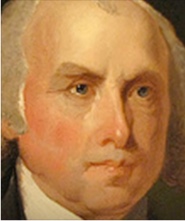
President James Madison.
As the world ponders why the American Right -- through its Tea Party power in Congress -- is threatening to shut down the federal government and precipitate a global economic crisis by defaulting on U.S. debt, the answer goes to the self-image of these rightists who insist they are the true defenders of the Founding Principles.
This conceit is reinforced by the vast right-wing media via talk radio, cable TV, well-funded Internet sites and a variety of books and print publications. Thus, the Tea Partiers and many Republicans have walled themselves off from the actual history, which would show the American Right to be arguably the opposite of true patriots, actually the faction of U.S. politics that has most disdained and disrupted the orderly constitutional process created in 1787.
It is true that the racist Right has often moved in tandem with the wealthy-elite Right, which has regarded the regulatory powers of the federal government as a threat to the ability of rich industrialists to operate corporations and to control the economy without regard to the larger public good. Indeed, the history of the American Right can be roughly divided into four eras: the pre-Confederate period from 1787 to 1860 when slave owners first opposed and then sought to constrain the Constitution, viewing it as a threat to slavery; the actual Confederacy from 1861 to 1865 when the South took up arms against the Constitution in defense of slavery; the post-Confederate era from 1866 to the 1960s when white racists violently thwarted constitutional protections for blacks; and the neo-Confederate era from 1969 to today when these racists jumped to the Republican Party in an attempt to extend white supremacy behind various code words and subterfuges.
But the historical reality is that both the white supremacists and the anti-regulatory corporatists viewed the Constitution as a threat to their interests because of its creation of a powerful central government that was given a mandate to "promote the general Welfare." The Constitution was far from perfect and its authors did not always have the noblest of motives, but it created a structure that could reflect the popular will and be used for the nation's good.
The key Framers of the Constitution -- the likes of George Washington, James Madison (who then was a protege of Washington) Alexander Hamilton and Gouverneur Morris (who wrote the famous Preamble) -- were what might be called "pragmatic nationalists" determined to do what was necessary to protect the nation's fragile independence and to advance the country's economic development.
In 1787, the Framers' principal concern was that the existing government structure -- the Articles of Confederation -- was unworkable because it embraced a system of strong states, deemed "sovereign" and "independent," and a weak central government called simply a "league of friendship" among the states.
The Constitution flipped that relationship, making federal law supreme and seeking to make the states "subordinately useful," in Madison's evocative phrase. Though the Constitution did make implicit concessions to slavery in order to persuade southern delegates to sign on, the shift toward federal dominance was immediately perceived as an eventual threat to slavery.
Fearing for Slavery
Key Anti-Federalists, such as Virginia's Patrick Henry and George Mason, argued that over time the more industrial North would grow dominant and insist on the elimination of slavery. And, it was known that a number of key participants at the Constitutional Convention in Philadelphia, including Benjamin Franklin and Alexander Hamilton, were strongly in favor of emancipation and that Washington, too, was troubled by human bondage though a slaveholder himself.
So, Henry and Mason cited the threat to slavery as their hot-button argument against ratification. In 1788, Henry warned his fellow Virginians that if they approved the Constitution, it would put their massive capital investment in slaves in jeopardy. Imagining the possibility of a federal tax on slaveholding, Henry declared, "They'll free your niggers!"
It is a testament to how we have whitewashed U.S. history on the evils of slavery that Patrick Henry is far better known for his declaration before the Revolution, "Give me liberty or give me death!" than his equally pithy warning, "They'll free your niggers!"
Similarly, George Mason, Henry's collaborator in trying to scare Virginia's slaveholders into opposing the Constitution, is recalled as an instigator of the Bill of Rights, rather than as a defender of slavery. A key "freedom" that Henry and Mason fretted about was the "freedom" of plantation owners to possess other human beings as property.
As historians Andrew Burstein and Nancy Isenberg wrote in their 2010 book, Madison and Jefferson, Henry and Mason argued that "slavery, the source of Virginia's tremendous wealth, lay politically unprotected." Besides the worry about how the federal government might tax slave-ownership, there was the fear that the President -- as commander in chief -- might "federalize" the state militias and emancipate the slaves.
Though the Anti-Federalists lost the struggle to block ratification, they soon shifted into a strategy of redefining the federal powers contained in the Constitution, with the goal of minimizing them and thus preventing a strong federal government from emerging as a threat to slavery.
In this early stage of the pre-Confederacy era, the worried slave owners turned to one of their own, Thomas Jefferson, the principal author of the Declaration of Independence and a charismatic politician who had been in France during the drafting and ratification of the Constitution and enactment of the Bill of Rights.
Though Jefferson had criticized the new governing document especially over its broad executive powers, he was not an outright opponent and thus was a perfect vehicle for seeking to limit the Constitution's reach. Even as Washington's Secretary of State, Jefferson began organizing against the formation of the new government as it was being designed by the Federalists, especially Washington's energetic Treasury Secretary Alexander Hamilton.
(Note: You can view every article as one long page if you sign up as an Advocate Member, or higher).





